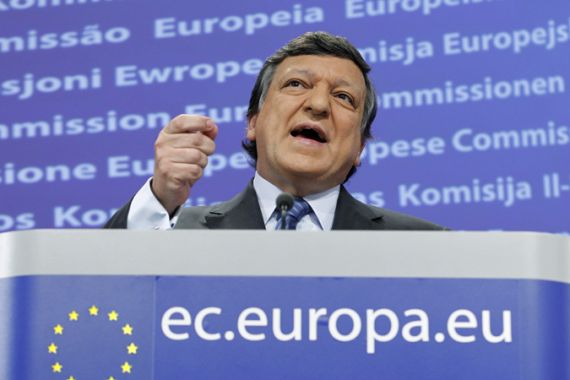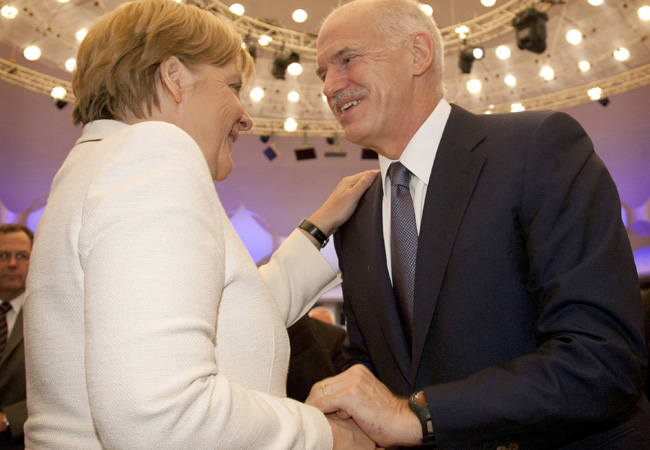Barroso: Greece will remain in the eurozone
Head of the European Commission says Greece will remain in 17-nation bloc but must meet its reform commitments in full.

 |
| Merkel has offered ‘all necessary help’ to Athens in a bid to lessen further damage to the rest of Europe [Reuters] |
Greece will remain in the eurozone but must meet its reform commitments in full, Jose Manuel Barroso, the head of the European Commission, has said.
In an annual address to the European parliament on Wednesday, Barroso countered persistent talk of Athens leaving the 17-nation bloc, saying: “Greece is, and will remain, a member of the euro area.”
But “Greece must implement its commitments in full and on time”, he stressed, pledging also that Europe would not let Athens down.
“In turn, the other Euro area members have pledged to support Greece and each other.”
International auditors were reported to be heading to the Mediterranean state to scrutinise new austerity measures they must endorse for Athens to meet its debt obligations.
The “troika” audit team from the European Commission, European Central Bank (ECB) and IMF is expected to begin arriving on Wednesday and launch talks the day after on the Greek government’s plan to deepen budget cuts and raise new taxes.
This will allow Athens to meet its commitments under a second aid programme that EU leaders agreed in principle in July that also touched off a new cycle of strikes and protests.
However, Angela Merkel, the German chancellor, has suggested that parts of the new $148.6bn rescue package for the debt-laden country could be reopened, depending on the outcome of the troika’s audit.
“We have to wait and see what the troika … finds and what it will tell us [whether] we will have to renegotiate or not,” she told Greek state television NET, without elaborating.
Second bailout
Germany has repeatedly said negotiations about the details of the second rescue deal can begin only when the troika says Greece has qualified to receive a fresh, sixth tranche under the first bailout agreed back in 2010.
The second bailout aims to ease Greece’s debt burden by imposing a 21 per cent loss on private Greek bondholders.
However, many economists believe that a 50 per cent loss is necessary to make the country’s debt viable.
London’s Financial Times newspaper reported that a split had opened in the eurozone over the deal.
|
Jan Randolph of IHS Global Insight discusses the debt crisis in interview to Al Jazeera |
Quoting senior European officials, it said as many as seven of its 17 countries argued that the private bondholders should swallow bigger writedowns.
Hardliners in Germany and the Netherlands were leading the calls for bigger writedowns but meeting fierce resistance from France and the ECB, which feared more selling of shares in European banks with big Greek bond holdings, it said.
Germany’s Bundestag (lower parliament) will vote on Thursday on widening the scope of the European Financial Stability Facility bailout fund, as agreed by the EU leaders on July 21.
Merkel faces a revolt within her conservative camp and may have to rely on support from the opposition Social Democrats and Greens to get the measure approved, damaging her authority.
In Greece, taxi drivers, bus and tram operators and tax collectors prepared to strike for a second day on Wednesday, with rail and metro workers promising to join them.
Al Jazeera’s Tim Friend, reporting from Athens, said: “The tax collectors are now on their second day of action. It is particularly ironic keeping in mind the Greek prime minister was in Berlin assuring the German leader that Greece would be a more dynamic economy, given that that no taxes were being collected at home.”
Property tax bill
Politicians opened the way to the troika visit on Tuesday by passing a property tax bill.
The tax will put further pressure on many Greeks already suffering from several waves of belt-tightening amid an economic downturn heading into its fourth year.
George Papandreou’s 154 Socialist deputies forced the measure through in the 300-seat parliament on Tuesday.
Police dispersed thousands of protesters with tear gas in Athens’s Syntagma Square, centre of anti-austerity protests that culminated in bloody clashes with police in June.
“I’ve been trying to find a job for a year now and it’s impossible,” Maria Kappa, a graduate of the School of Philosophy in Athens, said.
“I don’t see the rich people hurt by this austerity, it’s always the poor who have to pay.”
Global recession fears
Inertia in implementing the bailout deal coupled with European leaders’ inability to erect a wider safety net have stoked fears a Greek default could bring down other eurozone states such as Italy and Spain and trigger a new global recession.
Angry at the Greek government’s slowness in starting reforms, the troika quit talks with Athens this month and threatened to shut off funding unless it mended its ways.
Evangelos Venizelos, the finance minister, has since drafted a plan to catch up on the delays, which have put the government behind on a goal to cut the budget shortfall to 7.6 per cent of gross domestic product this year.
In the accelerated strategy, the government will cut the 730,000 public workforce by a fifth, reduce the public wage bill by 20 per cent, as well as lower overall pensions by four per cent in addition to a 10 per cent cut already agreed in previous plans.
It will also now extend the new real estate tax until 2014, two years longer than originally planned, after the troika judged Greece’s estimate that it would raise $2.7bn a year to be two times too high.
The EU and the IMF say Greece has been focusing too much on one-off tax measures to plug its budget gap rather than streamlining the administration and cutting spending.